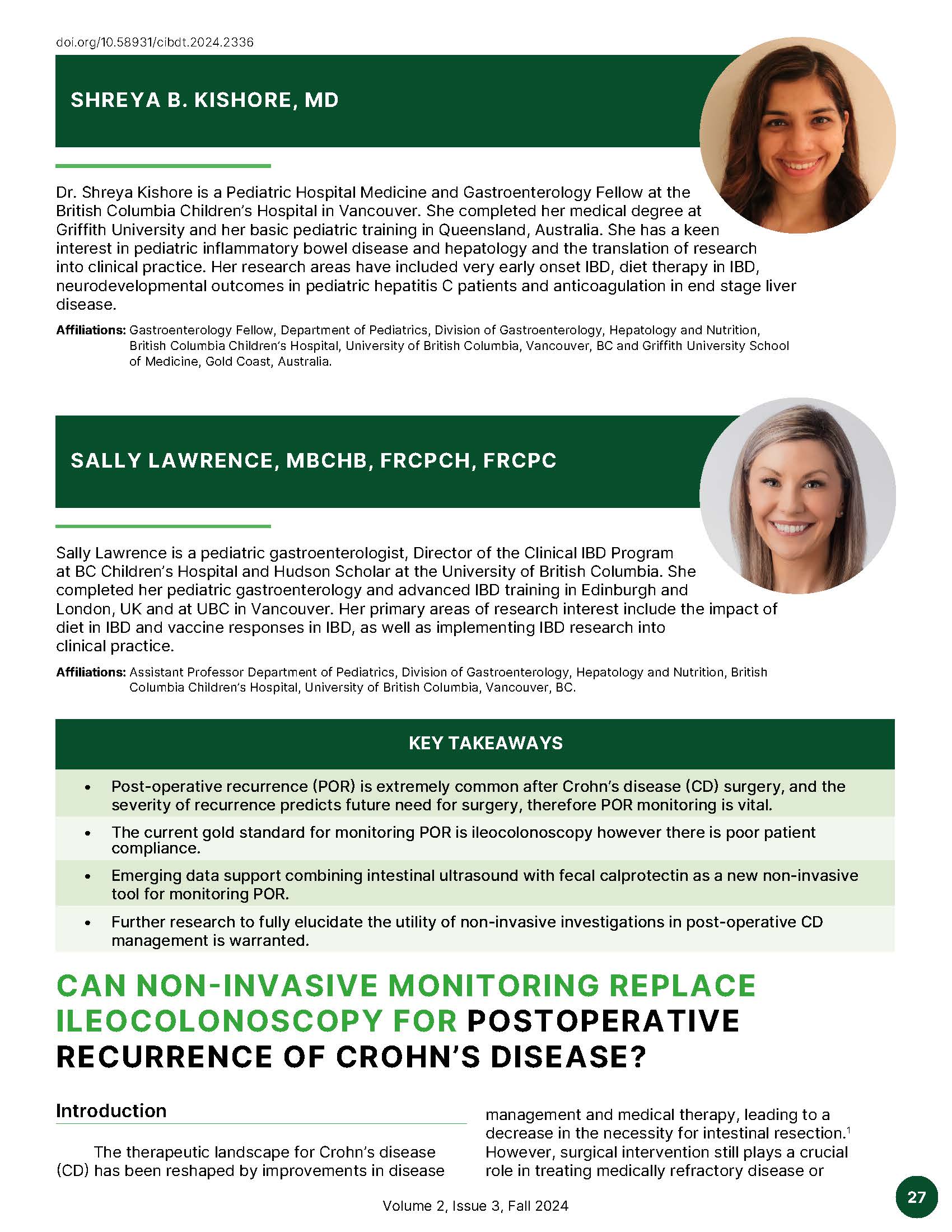Can Non-invasive Monitoring Replace Ileocolonoscopy for Postoperative Recurrence of Crohn’s Disease?
DOI:
https://doi.org/10.58931/cibdt.2024.2336Abstract
The therapeutic landscape for Crohn’s disease (CD) has been reshaped by improvements in disease management and medical therapy, leading to a decrease in the necessity for intestinal resection. However, surgical intervention still plays a crucial role in treating medically refractory disease or complications such as strictures or fistulae. Recent biologic-era population studies have shown that the rate of CD-related abdominal surgery over 10 years is up to 49.9% in adult-onset CD and 37.7% in pediatric onset CD.
References
Yamamoto T. Diagnosis and monitoring of postoperative recurrence in Crohn’s disease. Expert Rev Gastroenterol Hepatol. 2015 Jan 2;9(1):55-66. DOI: https://doi.org/10.1586/17474124.2014.940318
Spinelli A, Sacchi M, Fiorino G, et al. Risk of postoperative recurrence and postoperative management of Crohn’s disease. World J Gastroenterol. 2011 Jul 7;17(27):3213
Kurowski JA, Milinovich A, Ji X, et al. Differences in biologic utilization and surgery rates in pediatric and adult Crohn’s disease: results from a large electronic medical record-derived cohort. Inflamm Bowel Dis. 2021 Jul 1;27(7):1035-44. DOI: https://doi.org/10.1093/ibd/izaa239
Hamilton AL, De Cruz P, Wright EK, et al. Non-invasive serological monitoring for Crohn’s disease postoperative recurrence. J Crohns Colitis. 2022 Dec 1;16(12):1797-807. DOI: https://doi.org/10.1093/ecco-jcc/jjac076
Nguyen GC, Loftus EV, Hirano I, et al. American Gastroenterological Association Institute Guideline on the Management of Crohn’s Disease After Surgical Resection. Gastroenterol. 2017;152:271-5. Most recent AGA guidelines specifically evaluating the postoperative management of Crohn’s disease.
De Cruz P, Kamm MA, Hamilton AL, et al. Crohn's disease management after intestinal resection: a randomised trial. Lancet. 2015 Apr 11;385(9976):1406-17. DOI: https://doi.org/10.1016/S0140-6736(14)61908-5
Battat R, Sandborn WJ. Advances in the comprehensive management of postoperative Crohn’s disease. Clin Gastroenterol Hepatol. 2022 Jul 1;20(7):1436-49. DOI: https://doi.org/10.1016/j.cgh.2021.03.048
Dasharathy SS, Limketkai BN, Sauk JS. What’s new in the postoperative management of Crohn’s disease? Dig Dis Sci. 2022 Aug;67(8):3508-17. DOI: https://doi.org/10.1007/s10620-021-07205-w
Furfaro F, D’Amico F, Zilli A, et al. Noninvasive assessment of postoperative disease recurrence in Crohn’s disease: a multicenter, prospective cohort study on behalf of the italian Group for Inflammatory Bowel Disease. Clin Gastroenterol Hepatol. 2023 Nov 1;21(12):3143-51. DOI: https://doi.org/10.1016/j.cgh.2022.11.039
Fasulo E, D’Amico F, Osorio L, et al. The management of postoperative recurrence in Crohn’s disease. J Clin Med. 2023 Dec 25;13(1):119. DOI: https://doi.org/10.3390/jcm13010119
Boschetti G, Moussata D, Stefanescu C, et al. Levels of fecal calprotectin are associated with the severity of postoperative endoscopic recurrence in asymptomatic patients with Crohn’s disease. Am J Gastroenterol| ACG. 2015 Jun 1;110(6):865-72. DOI: https://doi.org/10.1038/ajg.2015.30
Tham YS, Yung DE, Fay S, et al. Fecal calprotectin for detection of postoperative endoscopic recurrence in Crohn’s disease: systematic review and meta-analysis. Therap Adv Gastroenterol. 2018 Jun 30;11:1756284818785571. DOI: https://doi.org/10.1177/1756284818785571
Boube M, Laharie D, Nancey S, et al. Variation of faecal calprotectin level within the first three months after bowel resection is predictive of endoscopic postoperative recurrence in Crohn's disease. Dig Liver Dis. 2020 Jul 1;52(7):740-4. DOI: https://doi.org/10.1016/j.dld.2020.03.020
Dragoni G, Allocca M, Myrelid P, et al. Results of the eighth scientific workshop of ECCO: Diagnosing postoperative recurrence of Crohn’s disease after an ileocolonic resection with ileocolonic anastomosis. J Crohns Colitis. 2023 Sep 1;17(9):1373-86. DOI: https://doi.org/10.1093/ecco-jcc/jjad055
Taylor SA, Mallett S, Bhatnagar G, et al. Magnetic resonance enterography compared with ultrasonography in newly diagnosed and relapsing Crohn's disease patients: the METRIC diagnostic accuracy study. Health Technol Assess. 2019 Aug;23(42):1. DOI: https://doi.org/10.3310/hta23420
Rispo A, Imperatore N, Testa A, et al. Diagnostic accuracy of ultrasonography in the detection of postsurgical recurrence in Crohn’s disease: a systematic review with meta-analysis. Inflamm Bowel Dis. 2018 Apr 23;24(5):977-88. DOI: https://doi.org/10.1093/ibd/izy012
Amor Costa C, Suarez Ferrer C, Poza Cordon J, et al. P485 Do intestinal ultrasound scores have a role in the diagnosis of postoperative recurrence? J Crohns Colitis. 2024 Jan 1;18(Supplement_1):i971-2. DOI: https://doi.org/10.1093/ecco-jcc/jjad212.0615
Kucharzik T, Maaser C. Intestinal ultrasound and management of small bowel Crohn’s disease. Therap Adv Gastroenterol. 2018 Apr 30;11:1756284818771367. DOI: https://doi.org/10.1177/1756284818771367
Schaefer M, Laurent V, Grandmougin A, et al. A magnetic resonance imaging index to predict Crohn’s disease postoperative recurrence: the MONITOR index. Clin Gastroenterol Hepatol. 2022 May 1;20(5):e1040-9. DOI: https://doi.org/10.1016/j.cgh.2021.06.035
Yung DE, Har-Noy O, Tham YS, et al. Capsule endoscopy, magnetic resonance enterography, and small bowel ultrasound for evaluation of postoperative recurrence in Crohn’s disease: systematic review and meta-analysis. Inflamm Bowel Dis. 2018 Jan 1;24(1):93-100. DOI: https://doi.org/10.1093/ibd/izx027

Published
How to Cite
Issue
Section
License
Copyright (c) 2024 Canadian IBD Today

This work is licensed under a Creative Commons Attribution-NonCommercial-NoDerivatives 4.0 International License.
